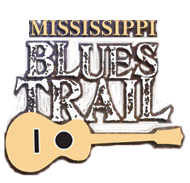Church Street
Church Street - Indianola
Church Street catered to every need of the African American community during the segregation era, when most area residents worked in the cotton fields during the week and came to town on weekends. Church Street (also designated as Church Avenue) offered everything from doctors’ offices to tailoring shops, from shoe shine stands to ice cream parlors, from Saturday night blues to Sunday morning church services. B. B. King often played for tips on the street as a teenager in the 1940s.
Church Street was once a crowded, bustling thoroughfare where African Americans shopped, socialized, dined, listened to music, and attended church services. In the segregated 1950s, ’60s, and earlier, according to Indianola attorney Carver Randle, “Church Street was an escape valve for black folks. On Saturdays Church Street had a festive kind of Mardi Gras atmosphere. People walked in the street and ate hot tamales and hot dogs and ice cream, drank corn whiskey and ate fish sandwiches. And although that was a tough time for black folks, we were pretty much self contained, all the way from fun to health care. If you made it to Church Street, you were all right.”
When the young B.B. King played on Church Street, he found that churchgoers would give him praise and moral encouragement for performing gospel songs, but tippers were more likely to reward him with money when he played blues. Jones Night Spot on Church Street was then the area’s premier blues venue, presenting bluesmen such as Robert Nighthawk and Robert Jr. Lockwood as well as the big bands of Count Basie and Duke Ellington. Jones later moved to Hanna Street and was renamed the Club Ebony. King appeared there often after turning professional.
Other spots on Church Street, including Sports Place, Stella B.’s, the Pastime Inn, the Cotton Club, the Blue Chip, the Key Hole Inn, Price Night Club, George’s Lounge, and Club Chicago, have offered blues music, most often on jukeboxes, although some have featured live entertainment. Guitarist David Lee Durham (1943-2008), who played with Bobby Whalen in the Ladies Choice Band, once had his own place on Church Street. Other local blues figures have included B.B. King’s cousin Jerry Fair, his wife Galean Fair, and James Earl “Blue” Franklin, a former member of the Greenville band Roosevelt “Booba” Barnes and the Playboys. A Canadian television crew filmed the Barnes group performing at the Key Hole Inn in 1990.
While other notable blues musicians have been born in Indianola, few of them played on Church Street, since most left the area when they were young. These include Albert King (1923-1992), who rivaled B.B. as a blues guitar king; Chicago harmonica players Jazz Gillum (1904-1966), famed for his 1940 recording of “Key to the Highway”) and Little Arthur Duncan (1934-2008); and brothers Louis (1932-1995) and Mac Collins (1929-1997),who were mainstays of the Detroit blues scene. Louis Collins, who performed under the name “Mr. Bo,” and David Durham both developed styles heavily influenced by B.B. King. Another Indianola native, Earl Randle (b. 1947), made his mark in Memphis as a songwriter.
content © Mississippi Blues Commission
[ BACK TO TOP ]

